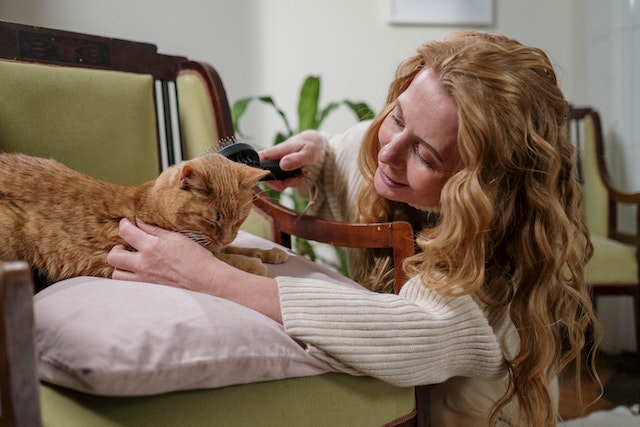Should Cats Be Groomed?
Do cats really need grooming? Are cat owners just being lazy? Or do cats need grooming because it makes them look nicer?
There are many reasons why cats should be groomed. Grooming helps remove loose hair from around the face and ears. It also removes mats and tangles from the coat. And most importantly, grooming gives cats a clean, fresh feeling.
Grooming your cat will make him feel cleaner and fresher. This means he'll be less likely to scratch furniture and carpets, and he'll be happier overall. In fact, grooming has even been shown to reduce stress levels in cats!
If you've never had a pet before, you might wonder whether cats need grooming. But once you get used to having a cat, you'll see how important it is to groom him regularly.
I'm going to tell you exactly how often you should brush your cat, as well as how to properly groom your cat.
Cats should be groomed when they appear dirty and unkempt. This includes their fur, ears, paws, tail and face. The best grooming tools include a comb, brush, nail clippers, scissors, ear cleaner and eye dropper. It's recommended you use these items every week so your cat gets used to them.
If your cat doesn't like having its coat brushed out, try using a soft bristle brush. You can also give your cat a bath once a month if he or she likes this. Bathing cats helps keep them clean and healthy.
Regluar Grooming

Cats should be groomed if they have long hair, fur around their face, ears, neck, tail, paws, belly, chest, back, legs, and feet. Grooming your cat helps maintain its health, appearance, and cleanliness. If you want to keep your cat healthy, grooming is essential!
Grooming your cat keeps him from getting fleas, ticks, mites, ear infections, eye problems, skin conditions, and parasites. Keeping your cat's coat short prevents matting and tangling. A well-groomed cat looks good and feels great.
If you don't brush your cat regularly, his fur gets dirty, making him look unkempt. Fur buildup causes mats, which cause itching and scratching. The longer your cat's fur grows, the harder it becomes to comb out. Brushing your cat's fur removes dead cells and dirt, keeping it soft and shiny.
A few days before your next grooming session, give your cat a bath. Bathing your cat is easier than bathing yourself, since you won't get shampoo in your eyes. Place your cat in a tub filled with warm (not hot) water. Let him soak for five minutes. Then, carefully lift him out of the tub and pat dry.
Groomers use special brushes and combs to remove loose hairs, knots, tangles, and mats. They also trim away any excess hair. Some cats like to be brushed while others do best when left alone. You'll know how your cat reacts to brushing because he'll tell you.
Regular Brushing
Brush your cat at least once every two weeks. Brush your cat gently so as not to pull too hard on his skin. Use a light touch and avoid pulling on his ears, eyes, lips, nose, or mouth. Avoid pinching or squeezing his skin. When you're finished, rinse your cat off with cool water.
But brushing also helps keep her skin healthy and clean. Brush your cat regularly to remove loose hairs and dead hair from her fur. This keeps her skin soft and smooth.
You might notice some shedding during this process. Don't worry; most cats shed up to one hundred times a year. This is normal and natural. Shedding usually occurs after your cat eats or plays.
Regular bathing
Regular bathing for cats will reduce shedding and help reduce hairballs. Bathing will also reduce matting. Long-haired breeds, such as Persians, Himalayans, Ragdolls, and Siberians, need frequent brushing. Bathing can also help minimize shedding by removing dirt and excess oils.
Before bathing your cat, make sure you have all the items you will need. You should avoid leaving your cat unattended. Also, make sure your cat is in a stress-free room, with few distractions. Make sure the water is warm, but not hot. If possible, pre-fill the tub. You'll also want to trim the nails of your cat to prevent scratching.
Some felines enjoy the water, but most aren't so eager to get in it. For this reason, it's best to introduce the concept of bathing slowly, and not overwhelm them right away. Cats who don't like the water will need extra attention before their first bath. While this behavior is not normal, it is part of the animal's innate programming.
Although cats don't enjoy being bathed, regular bathing will help your pet stay healthy and happy. It stimulates the skin and removes excess oil, dander, and dead hair. It also minimizes the amount of pet hair that gets on furniture and clothing.
Regular home check-ups
If you have a cat, you should perform regular home check-ups. This is a great way to identify problems early. You can do this by running your hands over your cat's body. If you notice any changes, bring your cat to the veterinarian. Your veterinarian will perform a thorough physical exam on your cat, including the eyes, ears, mouth, teeth, fur, and heart. If there are any problems, the veterinarian can prescribe treatment and give you tips for improving your cat's health.
Your cat may be experiencing some physical changes as it ages. It is important to discuss these changes with your veterinarian so that they can determine if they are normal aging or indicate a disease. A regular check-up can help your cat live longer and be healthier, even if it is old. Your veterinarian may ask you about changes in appetite, hydration, activity during the day and at night, and litter box habits.
As your cat gets older, he or she may start showing signs of pain. This pain may be caused by natural body changes or by a disease or illness. Cats are great at hiding signs of weakness, so it is important to visit the vet regularly. Your vet is trained to spot these signs and can provide you with valuable advice on how to care for your cat.
Veterinary requirements
Grooming cats is one of the easiest ways to keep them looking their best, but you should also take care to follow veterinary requirements before doing it. Most groomers require your pet to be vaccinated and have the right vaccines to begin the grooming process. Some of these requirements will vary from one groomer to another. Before beginning the grooming process, make an appointment to visit your veterinarian so that he or she can examine your cat's coat condition and determine what kind of services your cat needs. Also, your vet will assess your cat's responses to touch and whether he or she is healthy enough to undergo cat grooming.
Cats should be groomed on a regular basis to prevent any infections and ensure proper hygiene. The nails and claws must be clipped short and should be regularly cleaned, as well as the eyes and gums. In addition to these, your pet should have his or her teeth cleaned regularly to prevent tartar buildup and gingivitis.
Benefits
Regular cat grooming can help your feline friend live a healthier, happier life. Regular brushing helps remove dead hair and stimulates new growth, bringing natural oils to the surface of the cat's skin. It also helps prevent matting on long coats, which can irritate the cat's skin and cause sores. Regular brushing will also remove dirt and debris from the cat's coat, which will make it feel softer and more comfortable.
Regular cat grooming also helps you detect fleas, ticks, and other parasites that could affect your pet's health. These parasites are easy to miss, so regular grooming will help you spot them. Regular grooming will also remove matted fur and disperse natural oils, improving the look and feel of your feline's fur.
If you have never groomed a cat before, start off gently and build up gradually. Start grooming your feline friend in areas where she enjoys being groomed, and work your way outward. If she objects or shows signs of stress, stop the grooming session and give her a break.
Regular grooming is beneficial for your cat's health, not to mention a great bonding experience. It can also prevent mats from forming and reduce your cat's stress levels. Regular brushing is easy to do and will improve your feline friend's hygiene. Regular brushing will also remove dead hair and prevent hairballs from forming in your cat's digestive system.
Conclusions
In conclusion, cats should definitely be groomed. They deserve it! But if you're wondering why, here's a quick explanation: grooming helps prevent hairballs, which can cause serious problems like vomiting and diarrhea. Plus, regular grooming keeps their coats clean and healthy, which makes them look better and feel happier. And lastly, grooming gives them a sense of pride and self-worth, which is priceless.

